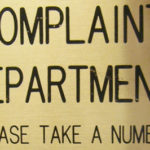I haven't noticed street protests like Occupy Wall Street since the 1960s. Unsettling terms like "class warfare" are being thrown about. People are angry regarding global, national and personal finances. How can Christians appropriately express their opinions in difficult times?
The marches and sit-ins of the '60s were directed at segregation and the Vietnam War. Demonstrators received criticism from other Americans who said of the United States that they ought to "love it or leave it." And now as the Occupy Wall Street movement targets the economic disparity of the nation, terms like "class warfare" have resurfaced. Use of such terms ratchets up fear among the citizenry that violence or more unsettledness, at the least, is just around the corner.
The Occupy Wall Street movement claims to speak for the 99 percent of Americans who are not part of the wealthiest 1 percent. Since 1979, tax rates for the rich have been reduced significantly. The top tax rate on earned income was cut in half; the tax rate on capital gains was cut almost as much. These policy changes have benefited the wealthiest Americans. The Federal Reserve Board reported in 2009, based on 2007 numbers, that the top 1 percent of U.S. citizens held more than one-third of the nation's wealth. The lowest 90 percent of Americans controlled only 28.5 percent of American wealth.
I regret some citizens feel they are not heard. The First Amendment to the U.S. Constitution, which guarantees freedom of religion, also assures that no law will be made "interfering with the right to peaceable assembly." Civil disobedience may become necessary as a last resort. Consequences likely will ensue. But in the case of today's Occupy Wall Street movement, as in the days of Martin Luther King Jr., such movements may change, and have changed, the winds of public opinion.
Instead of rallies sponsored by the Occupy movement or the Tea Party, we should make our voices heard by voting or writing letters to elected government officials. You might also express your opinion by writing letters to the editor of your local newspaper or this publication.
Creating a dialogue or action group in your church to focus on social policy is another option. Consider using the following examples as a starting point for conversation. Moses confronted Pharaoh over Hebrew enslavement. Jeremiah promised that God would send a shepherd like God when Judah's leaders failed. Amos advocated for the poor when oppressed by the wealthy. Shadrach, Meshach and Abednego refused to worship Nebuchadnezzar's idol. Christians should influence public policy but with the greatest civility possible.
David Morgan, pastor
Trinity Baptist Church
Harker Heights
Sign up for our weekly edition and get all our headlines in your inbox on Thursdays
Right or Wrong? is co-sponsored by the Texas Baptist theological education office and Christian Life Commission. Send your questions about how to apply your faith to [email protected].














We seek to connect God’s story and God’s people around the world. To learn more about God’s story, click here.
Send comments and feedback to Eric Black, our editor. For comments to be published, please specify “letter to the editor.” Maximum length for publication is 300 words.